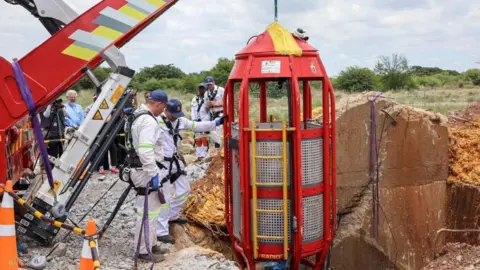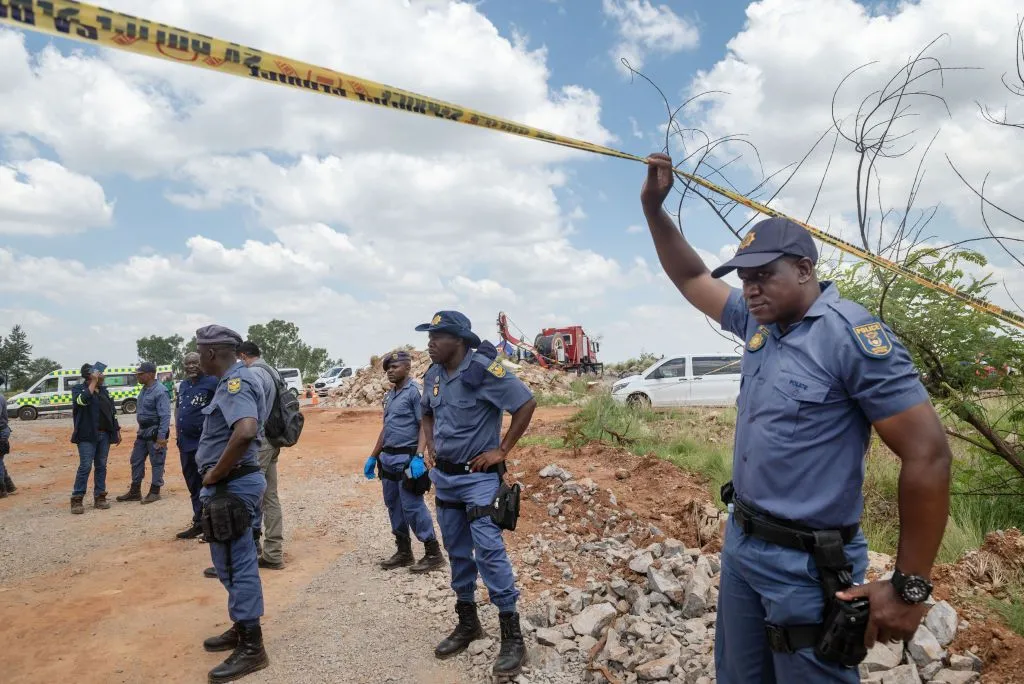Illegal Gold Mining in South Africa
"I felt like I have some bad luck because I had only been underground for two weeks when the operation started. That is when things started going bad, we stopped receiving food and we lost contact with the outside world, that could only mean that the police have arrived and probably arrested or scared off the people lowering the food.""By September, things were really bad. People started getting hungry they started getting sick, some started dying. We started having dead bodies. There is nothing worse than seeing somebody die and there is nothing you can do about it."(Name withheld) illegal miner
 |
| Rescuers lowered in a cage into the mine AFP |
Noxious
odours permeated the area; whether from the corpses wrapped in fabric
and twine, laid out in rows, or emanating from the unwashed bodies of
emaciated, starving miners, or stenches from the damp rock of the
environment. Emaciated from lack of food since police had cracked down
on illegal mining and had put a stop to the delivery of food supplies,
water, fuel and other life-saving necessities. Their usual diet while
underground was meat, bread and porridge cooked over propane-heated camp
stoves.
They had been reduced to eating rough salt to try to staunch hunger.
While
they still had those supplies, they smoked cigarettes and marijuana,
until they ran out. Cellphone videos and miners' testimonies shed light
on the horror that hundreds of men suffered underground in an abandoned
mine in South Africa following a police operation that cut off food and
supplies in a strategy to "smoke them out", because authorities
considered the 2,000 men working deep underground in one of South
Africa's largest and deepest mines, to be criminals, illegally mining
for gold.
Eventually
police were forced by a court order to launch a rescue effort early in
the week. When the mission was completed, they reported that no one had
been left underground. Dozens of bodies had been pulled out, with a
minimum of 87 confirmed dead. One miner speaking on condition of
anonymity fearing reprisals, had surfaced Christmas Day, months after he
entered the shaft in July. One among the two thousand who ventured
there, he experienced extreme hunger and witnessed fellow diggers
expiring from starvation and illness.
In
August of last year when police targeted the mine near the town of
Stilfontein as part of an operation aiming to tackle widespread illicit
mining, the man, 40 years of age, father of six children, eventually
exited the mine through a separate shaft clambering up and out
laboriously on steep steel stairs extremely difficult to navigate, upon
which he badly bruised his hands climbing out.
"As we were climbing out we saw dead bodies of other guys who had attempted to exit the same way. Others had fallen down, others were full corpses but there were also lots of bones, almost like skeletons.""It's not easy to exit there, many people died trying to do that."(Name withheld) illegal miner
Illegal
mining represents one of the largest sources of income for poor
families in townships located nearby an estimated 6,100 disused mines
country-wide. And this is where illegal mining tends to be rife.
Persuaded when he was told he could earn about $5,300 for working a few
weeks to a month in one of the country's deepest gold mines no longer
officially operating, he took up the offer in a country with one of the
highest unemployment rates in the world.
Many
of the miners arrive searching for employment from neighbouring
countries like Mozambique, Zimbabwe, Lesotho, Malawi and Congo as
illegal arrivals in South Africa where their presence is generally held
in contempt. Also working in the mine were 13 children.
Mmastona
Mbizna explained that two of her sons were engaged in illegal mining as
a result of poverty and steep unemployment. Her 22-year-old son was
arrested when he left the mine in December. Another son was arrested at
the same mine working as a runner on the surface, lowering supplies down
to the miners. He was convicted for involvement in illegal mining. "Out
of the blue the police came, firing rubber bullets and tear gas. The
tear gas blinded me and I fell, broke my leg and collapsed", he said.
The
government maintains what though the deaths were tragic, illegal mining
is a criminal activity detrimental to the country's economy. "The
people who must take responsibility for the deaths that have happened
here are those who are benefiting from illegal mining", said Mines Minister Gwede Mantashe, in Stilfontein.
 |
| The police have defended the operation at Stilfontein, saying it was about dealing with criminality Getty Images |
"I heard from somebody in the neighbourhood that he [her 22-year-old younger son] had gone underground.""His father died last year and he was not even here for the funeral because he was underground for months."Mmastona Mbizana, Khumo township community member
Labels: Abandoned Mines, Illegal Mining Police Standoff, Siege, South Africa, Starvation
0 Comments:
Post a Comment
<< Home